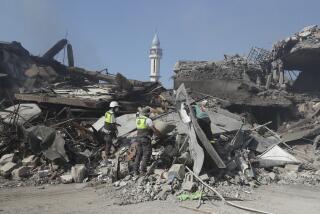Arabs Protest Israeli Attack
BEIRUT — From streets choked with tear gas to presidential and royal palaces, Arabs across the Middle East condemned the Israeli attack on Yasser Arafat’s headquarters Friday, saying the Jewish state prefers aggression to peace.
Palestinian refugees protested in Lebanon, Jordan and Syria, burning tires or meeting truncheons and water cannon blasts with chants of “Death to Israel!” while political leaders framed Israel’s offensive as a rejection of an Arab peace overture and urged international intervention.
“This is not only against Arafat, it is against the peace plan submitted by the Arabs,” said Lebanese Prime Minister Rafik Hariri, referring to a Saudi peace proposal endorsed Thursday by the Arab League at a summit in Beirut. The Arab nations offered Israel peace and normal relations in exchange for a withdrawal from territory it seized in 1967 and other concessions.
Lebanon’s information minister, Ghazi Aridi, accused Israeli Prime Minister Ariel Sharon of aiming to “bring down the Palestinian Authority and reoccupy all the Arab lands.”
Arab leaders held telephone conversations with Arafat, the Palestinian Authority president, who was inside his besieged compound in the West Bank city of Ramallah.
“Sharon has declared war, a war that he cannot win because the will of the people is stronger than the Israeli tanks,” Egyptian Foreign Minister Ahmed Maher said.
King Abdullah II of Jordan accused Israel of escalating the violence and threatening Arafat’s life and said the Jewish state had violated all international conventions, the official Jordanian news agency reported. The monarch telephoned Arafat earlier Friday.
Egyptian President Hosni Mubarak sent an urgent message to President Bush calling for immediate American intervention, Egyptian state media reported. Arab League Secretary-General Amr Moussa, also an Egyptian, called Arafat, Secretary of State Colin L. Powell, European Union foreign policy chief Javier Solana and U.N. Secretary-General Kofi Annan. Annan convened an emergency session of the U.N. Security Council to discuss the crisis.
Moussa said the Arab League would hold a meeting in Cairo today to discuss what steps Arab states can take.
Iranian radio quoted Foreign Ministry spokesman Hamid Reza Asefi as saying, “The occupation of Ramallah today is another example of the state terrorism of the Zionist regime.”
In many Arab countries, TV images of Israeli forces entering Ramallah added to the anger against Israel, already heightened after 18 months of Israeli-Palestinian violence.
In Egypt, state-run television preempted its regular programming to follow developments in the Palestinian territories. Pan-Arab satellite TV network Al Jazeera broadcast footage of the raids on the compound.
At entrances to the Ein el Hilwa refugee camp in southern Lebanon, Palestinians burned tires in protest. A general strike closed shops and schools, and thousands of angry Palestinians shouted anti-Israel slogans and waved Palestinian flags.
In Jordan, Palestinian refugees in two camps near Amman, the capital, called for holy war and for the removal of the Israeli ambassador. Riot police threw tear gas canisters at hundreds of protesters at one camp.
Syrian police used water cannons and truncheons to prevent about 2,000 Palestinian protesters in the Yarmouk refugee camp near Damascus, the capital, from marching toward the U.S. Embassy.
And in a peaceful protest, about 1,000 Palestinian supporters marched through Dubai in the United Arab Emirates, chanting, “Death to Israel!”
More to Read
Sign up for Essential California
The most important California stories and recommendations in your inbox every morning.
You may occasionally receive promotional content from the Los Angeles Times.










